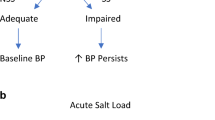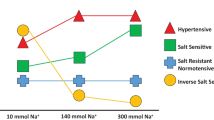Abstract
Clinical trials have demonstrated that a reduced intake of dietary sodium lowers blood pressure. However, blood pressure reduction in response to a decrease in dietary sodium intake varies considerably among different individuals—a phenomenon described as sodium sensitivity. The Genetic Epidemiology Network of Salt Sensitivity (GenSalt) study was a large family-based dietary-feeding study conducted in rural north China. This study indicated that approximately 39% of Chinese adults were sodium-sensitive. Sodium sensitivity was more common in women and in persons who were older and had higher usual blood pressure. Sodium sensitivity was also more common in individuals with higher responses to a cold pressor test and in individuals with the metabolic syndrome. Genetic factors may play an important role in determining sodium sensitivity in the Chinese population. A better understanding of the genetic and environmental determinants of sodium sensitivity has important public health and clinical implications.

Similar content being viewed by others
References
Papers of particular interest, published recently, have been highlighted as: • Of importance •• Of major importance
Kearney PM, Whelton M, Reynolds K, et al.: Global burden of hypertension: analysis of worldwide data. Lancet 2005, 365:217–223.
Lawes CMM, Vander Hoorn S, Rodgers A, et al.: Global burden of blood-pressure-related disease, 2001. Lancet 2008, 371:1513–1518.
He J, Gu D, Chen J, et al.: Premature deaths attributable to blood pressure in China: a prospective cohort study. Lancet 2009, 374:1765–1772.
Whelton PK, He J, Appel LJ, et al.: Primary prevention of hypertension. clinical and public health advisory from the National High Blood Pressure Education Program. JAMA 2002, 288:1882–1888.
Chobanian AV, Bakris GL, Black HR, et al.: The Seventh Report of the Joint National Committee on Prevention, Detection, Evaluation, and Treatment of High Blood Pressure: the JNC 7 report. JAMA 2003, 289:2560–2572.
Weinberger MH: Salt sensitivity of blood pressure in humans. Hypertension 1996, 27:481–490.
Morimoto A, Uzu T, Fujii T, et al.: Sodium sensitivity and cardiovascular events in patients with essential hypertension. Lancet 1997, 350:1734–1737.
Weinberger MH, Fineberg NS, Fineberg SE, Weinberger M: Salt sensitivity, pulse pressure, and death in normal and hypertensive humans. Hypertension 2001, 37:429–432.
Kawasaki T, Delea CS, Bartter FC, Smith H: The effect of high-sodium and low-sodium intakes on blood pressure and other related variables in human subjects with idiopathic hypertension. Am J Med 1978, 64:193–198.
Sanders PW: Dietary salt intake, salt sensitivity, and cardiovascular health. Hypertension 2009, 53:442–445.
Beeks E, Kessels AG, Kroon AA, et al: Genetic predisposition to salt-sensitivity: a systematic review. J Hypertens 2004, 22:1243–1249.
GenSalt Collaborative Research Group: GenSalt: rationale, design, methods and baseline characteristics of study participants. J Hum Hypertens 2007, 21:639–646.
•• He J, Gu D, Chen J, et al.: Gender difference in blood pressure responses to dietary sodium intervention in the GenSalt study. J Hypertens 2009, 27:48–54. This large, well-controlled feeding study indicated that BP responses to dietary sodium intake were normally distributed in populations and there was no evidence for a bimodal distribution. Sodium sensitivity appears to be a common biologic phenomenon in human populations. BP responses to dietary sodium intake were greater in women, those 45 years of age or older, and those with a higher baseline BP level.
Luft FC, Weinberger MH: Heterogeneous responses to changes in dietary salt intake: the salt-sensitivity paradigm. Am J Clin Nutr 1997, 65(suppl):612S–617S.
Wright JT Jr, Rahman M, Scarpa A, et al.: Determinants of salt sensitivity in black and white normotensive and hypertensive women. Hypertension 2003, 42:1087–1092.
Vollmer WM, Sacks FM, Ard J, et al.: Effects of diet and sodium intake on blood pressure: subgroup analysis of the DASH-Sodium trial. Ann Intern Med 2001, 135:1019–1028.
Wood DL, Sheps SG, Elveback LR, Schirger A: Cold pressor test as a predictor of hypertension. Hypertension 1984, 6:301–306.
Menkes MS, Matthews KA, Krantz DS, et al.: Cardiovascular reactivity to the cold pressor test as a predictor of hypertension. Hypertension 1989, 14:524–530.
Kasagi F, Akahoshi M, Shimaoka K: Relation between cold pressor test and development of hypertension based on 28-year follow-up. Hypertension 1995, 25:71–76.
Strazzullo P, Barbato A, Vuotto P, Galletti F: Relationships between salt sensitivity of blood pressure and sympathetic nervous system activity: a short review of evidence. Clin Exper Hypertens 2001, 23:25–33.
•• Chen J, Gu D, Jaquish CE, et al.: Association between blood pressure responses to the cold pressor test and dietary sodium intervention in a Chinese population. Arch Intern Med 2008, 168:1740–1746. This large, population-based, diet-feeding study identified a dose-response relationship between BP responses to the CPT and to dietary sodium interventions. This relationship was highly statistically significant and independent of other covariates.
Shimamoto K, Hirata A, Fukuoka M, et al.: Insulin sensitivity and the effects of insulin on renal sodium handling and pressor systems in essential hypertensive patients. Hypertension 1994, 23:129–133.
Galletti F, Strazzullo P, Ferrara I, et al.: Salt sensitivity of essential hypertensive patients is related to insulin resistance. J Hypertens 1997, 15:1485–1491.
•• Chen J, Gu D, Huang J, et al.: Metabolic syndrome and salt sensitivity of blood pressure in non-diabetic people in China: a dietary intervention study. Lancet 2009, 373:829–835. This large, population-based, diet-feeding study identified a strong, positive, and significant association between the metabolic syndrome and salt sensitivity of BP among persons without diabetes. The salt sensitivity of BP increased progressively with a higher number of metabolic risk factors, and this association was independent of age, gender, body mass index, physical inactivity, cigarette smoking, alcohol consumption, and baseline dietary intake of sodium and potassium.
Saavedra JM: Studies on genes and hypertension: a daunting task. J Hypertens 2005, 23: 929–932.
Rotimi CN, Cooper RS, Cao G, et al.: Maximum-likelihood generalized heritability estimate for blood pressure in Nigerian families. Hypertension 1999, 33: 874–878.
Mitchell GF, DeStefano AL, Larson MG, et al.: Heritability and a genome-wide linkage scan for arterial stiffness, wave reflection, and mean arterial pressure: the Framingham Heart Study. Circulation 2005, 112:194–199.
• Gu D, Rice T, Wang S, et al.: Heritability of blood pressure responses to dietary sodium and potassium intake in a Chinese population. Hypertension 2007, 50:116–122. This study reported moderate heritabilities of blood pressure responses to dietary sodium intake in a Chinese population.
Iwai N, Kajimoto K, Tomoike H, Takashima N: Polymorphism of CYP11B2 determines salt sensitivity in Japanese. Hypertension 2007, 49:825–831.
Eap CB, Bochud M, Elston RC, et al.: CYP3A5 and ABCB1 genes influence blood pressure and response to treatment, and their effect is modified by salt. Hypertension 2007, 49:1007–1014.
Laffer CL, Gainer JV, Waterman MR, et al.: The T8590C polymorphism of CYP4A11 and 20-hydroxyeicosatetraenoic acid in essential hypertension. Hypertension 2008, 51:767–772.
Zeng C, Villar VA, Eisner GM, et al.: G protein-coupled receptor kinase 4: role in blood pressure regulation. Hypertension 2008, 51:1449–1455.
Felder RA, Sanada H, Xu J, et al.: G protein-coupled receptor kinase 4 gene variants in human essential hypertension. Proc Natl Acad Sci U S A 2002, 99:3872–3877.
Staessen JA, Kuznetsova T, Zhang H, et al.: Blood pressure and renal sodium handling in relation to genetic variation in the DRD1 promoter and GRK4. Hypertension 2008, 51:1643–1650.
• Kelly TN, Rice TK, Gu D, et al.: Novel genetic variants in the alpha-adducin and guanine nucleotide binding protein beta-polypeptide 3 genes and salt sensitivity of blood pressure. Am J Hypertens 2009, 22:985–992. This study reported a significant association between genetic variants in the α-adducin (ADD1) gene and guanine nucleotide binding protein (G protein) β-polypeptide 3 (GNB3) gene and the sodium sensitivity of BP in a Chinese population.
Acknowledgement
The Genetic Epidemiology Network of Salt Sensitivity is supported by research grants (U01HL072507, R01HL087263, and R01HL090682) from the National Heart, Lung, and Blood Institute, National Institutes of Health, Bethesda, MD. Dr. Jing Chen was supported by a grant (P20-RR017659) from the National Center for Research Resources, National Institutes of Health, Bethesda, MD.
Disclosure
No potential conflict of interest relevant to this article was reported.
Author information
Authors and Affiliations
Corresponding author
Rights and permissions
About this article
Cite this article
Chen, J. Sodium Sensitivity of Blood Pressure in Chinese Populations. Curr Hypertens Rep 12, 127–134 (2010). https://doi.org/10.1007/s11906-009-0088-4
Published:
Issue Date:
DOI: https://doi.org/10.1007/s11906-009-0088-4




